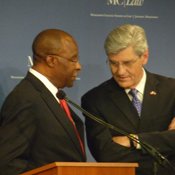Mississippi's two candidates for governor stayed polite and avoided any appearance of negative attacks at a debate Friday night. Lt. Gov. Phil Bryant and Hattiesburg Mayor Johnny DuPree invoked friendship, bipartisanship and a new way of politicking in Mississippi. Perhaps that explains why they did not emphasize many major differences between them, even on contentious issues such as ballot initiatives and how to reduce the number of teen pregnancies in the state.
DuPree and Bryant answered questions about bipartisanship, health-care reform and early childhood education at the only scheduled debate between the two nominees. The Mississippi College School of Law hosted the televised debate, and AARP sponsored it.
On most issues, the candidates' views seemed to vary little. Regarding how to reduce the number of teen births in Mississippi, both emphasized the community's role in teaching teens to wait until they are older to have children. Bryant said last year's law requiring school districts to adopt a sex-education policy will allow schools--in some districts, at least--to teach abstinence-plus sex education.
"If a parent agrees, we can teach more science to a child, so that those children understand what can go wrong," he said. "... But again, I think we need to say to parents and grandparents alike, 'I am not individually responsible for what happens to your child. Now, we all have a shared destiny, but you have to step up.'"
DuPree, who said his wife and he started out as teen parents, said the church, the educational system and the community must work together to help teens, as people did when he and his wife were young parents.
"This teen pregnancy issue is not something you're going to solve overnight," he said. "... It's going to take education in order to do that, it's going to take, again, the community to pull together."
Bryant and DuPree did differ on the health-care reform bill that Congress passed last year.
"I'm extremely concerned with the Obamacare health care, as some people call it," Bryant said, adding that the act will add 400,000 Mississippians to the Medicaid roll.
"You've got to realize, we've got 640,000 Mississippians now on the Medicaid roll; that's a million people in a state of 3 million. ... That's impossible to afford," he said. Bryant said the state contributes 25 percent of Medicaid expenses.
Bryant touted a health-care exchange, nationwide tort reform and job creation as the best ways to bring down the cost of health insurance. He also criticized the act's controversial individual insurance requirement, calling it a violation of civil liberties.
While DuPree said some aspects of the health-care reform act should concern people, it will bring in $20 million to help the half a million uninsured people in the state get insurance. He agreed with Bryant that a health-care exchange will bring down costs, but said the bill makes such an exchange possible.
"Without the $20 million, it wouldn't happen, and we would still be talking about what we are going to do with the half a million people in Mississippi (without insurance)," DuPree said.



Comments
Use the comment form below to begin a discussion about this content.
comments powered by Disqus